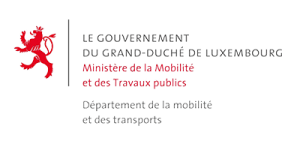Organisers

The Ministry of Mobility and Public Works
The governmental declaration has set out specific objectives for each of the departments within the Ministry of Mobility and Public Works, namely the Department of Mobility and Transport and the Department of Public Works.
The Ministry of Mobility and Public Works implements an integrated transport policy. The government seeks to ensure that addressing mobility bottlenecks for both professional and leisure activities is made a top priority.
The sustainable mobility strategy (Modu 2.0) serves as a set of guidelines, which need to be further developed and implemented, for this purpose.
The aim is to ensure good public transport coverage and to factor in active mobility in the planning stage of all road and rail infrastructure projects, public buildings, new housing developments, leisure facilities and shopping centers. Targeted management of parking areas will also be introduced.
In this context, following the strategy Modu 2.0, a national mobility plan will be elaborated and adapted to the needs and demands projected for horizon 2035.
In order to gather the necessary data for mobility planning in an efficient and continuous way, adapted to the constant evolution of needs, a mobility observatory will be put in place.
After the launch of the Modu 2.0 multimodal strategy in 05/2018 and the successful introduction of free public transport across the Grand Duchy of Luxembourg in 03/2020, François Bausch, Deputy Prime Minister, Minister for Mobility and Public Works, presented the National mobility plan 2035 during an international press conference on Friday 22nd April 2022.
The innovative PNM 2035 - National mobility plan offers a global concept capable of managing 40 % more trips compared to 2017. It implements the approaches recommended by the Modu 2.0 strategy for sustainable mobility, namely:
- moving from a catch-up logic to a logic of anticipation of future demand;
- first determine the number of people who will have to go to a specific place
- and then reinforce the modes of transport best suited to the context and finally mobilize the four actors of mobility, i.e. the State, the municipalities, employers and citizens.
François Bausch, Deputy Prime Minister and Minister for Mobility and Public Works, also presented the PNM 2035 to the public during 10 public presentations.
To download and order the National mobility Plan 2035, available in English, German and French, or for more information visit: www.pnm2035.lu

Luxembourg City
Luxembourg City is a cosmopolitan, multicultural city, scaled to human dimensions, located in the very heart of Europe. As a founding member of the European Union and the seat of several EU institutions, Luxembourg City not only ranks as one of Europe's foremost cities in terms of quality of life, but also boasts a rich and diverse population. Luxembourg City is home to 167 nationalities and has a population of over 128,000 residents. The city also attracts more than 200,000 daily commuters as well as a large number of tourists.
As the city's population has grown by more than 36% in the last decade, and because it is an attractive destination for companies and institutions, the City of Luxembourg is faced with a number of challenges in terms of mobility, making it a key priority in its development strategy. Accordingly, further to recent extensions and improvements, the City's bus network now comprises 39 lines covering the city's 24 districts. City of Luxembourg buses are used by more than 29.8 million passengers and cover some 13.2 million kilometres each year. And the city's public transport offering has been further enhanced with the introduction and extension of the city's tram system. As its ultimate goal is to create future mobility options that are sustainable and efficient, the City of Luxembourg has begun taking steps to complete the electrification of its entire fleet by 2030.
In addition to its public transport services, The City of Luxembourg has also introduced other measures, including a car-sharing system (carl'OH), a self-service bike rental system (vel'OH), and the development of a cycle network comprising some 170 km of cycling routes.
At the Mobil-Lux conference, Luxembourg City Mayor Lydie Polfer will present an overview of the city's mobility strategy and its Mobility Plan.
For more information, see Our Mobility Plan for Tomorrow | Ville de Luxembourg (vdl.lu).

Luxtram
LUXTRAM– a publicly owned limited company (société anonyme à capitaux publics) – is the Luxembourg enterprise tasked with the planning, development, building and operation of the tram system in Luxembourg City and neighbouring municipalities. It is also responsible for the management and maintenance of all tram-related infrastructure and of the trams themselves. It carries out all studies and building works in connection with the city's tram system, and is the competent authority for the awarding of contracts and the procurement of rolling stock.
LUXTRAM expects line 1 to be fully completed – from Findel Airport to Cloche d’Or – by the end of 2024. Two years ago, LUXTRAM was awarded the contracts for future extensions of the City of Luxembourg tram system and the construction of a high-speed tram link between Luxembourg City and Esch-sur-Alzette.
Luxtram is unquestionably a key contributor in the process of diversifying the public transport system and developing sustainable mobility in Luxembourg. As one of the co-organisers of the Mobil-Lux Conference, LUXTRAM is looking forward to sharing its expertise and operational experience with attendees involved in the mobility sector.
Mobil-Lux Organisation Committee
The Mobil-Lux Organisation Committee comprises representatives from the three organisations mentioned above, and is supported by two scientific experts, one German-and one French-speaking.
